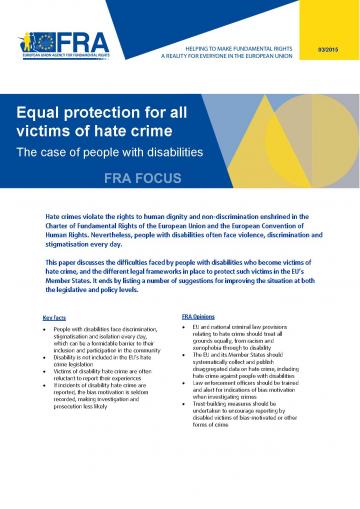People with disabilities have been excluded from mainstream society for centuries, and still face discrimination, stigmatisation and isolation even today. Research by FRA shows that violence, harassment and abuse are common experiences for many people with disabilities, creating a formidable barrier to their inclusion and participation in the community. An age-old assumption that disabled people should be pitied, rather than respected as individuals with the right to live free from violence, often detracts from the severity of the violence they face, making it more difficult to recognise either its causes or its consequences.
Key facts
- People with disabilities face discrimination, stigmatisation and isolation every day, which can be a formidable barrier to their inclusion and participation in the community
- Disability is not included in the EU’s hate crime legislation
- Victims of disability hate crime are often reluctant to report their experiences
- If incidents of disability hate crime are reported, the bias motivation is seldom recorded, making investigation and prosecution less likely
FRA Opinions
- EU and national criminal law provisions relating to hate crime should treat all grounds equally, from racism and xenophobia through to disability
- The EU and its Member States should systematically collect and publish disaggregated data on hate crime, including hate crime against people with disabilities
- Law enforcement officers should be trained and alert for indications of bias motivation when investigating crimes
- Trust-building measures should be undertaken to encourage reporting by disabled victims of bias-motivated or other forms of crime
